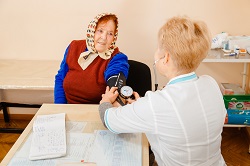In-country activities
Moldova | Piloting models of integrated care to tackle the burden of Non-Communicable Diseases

The limited success of the health sector to reach positive results in the prevention and management of NCDs is influenced by social factors and the poor socio-economic status of the target population (mostly elderly, retired persons, with low income, difficult life conditions, poor nutrition and limited opportunities for rehabilitation and recuperation). In recent years, the social sector in Moldova has taken important steps to establish prevention programmes and cross-sectoral approaches in response to the challenges of child protection, trafficking and domestic violence. These approaches are now applied in all working procedures and provision of social services, thus addressing vulnerability from a needs perspective with health considered part of a wider definition of wellbeing. An analysis of the social sector by SDC’s Healthy Life Project revealed that both sectors have systems with inter-related elements and services that could be extended and adjusted to ensure appropriate support and assistance to people affected by NCDs.
In agreement with the Ministry of Health, Labour and Social Protection, three district councils are piloting strategies to extend the inter-linkages through a case management approach, tap into resources from both the health and social sector, and bring greater efficiency to the prevention and management of NCDs. In this context, the Directorates for Social Assistance and Family Protection (DASFP) and of Primary Health Care in the highly disadvantaged Cula region of Ungheni district have jointly planned and built multi-disciplinary teams consisting of medical and social assistants as core members. A Centre for Rehabilitation and Social Integration for the Elderly is starting to host health workers to provide comprehensive health services to the beneficiaries, while the Social Emergency Services are being drawn upon to transport people at high risk of acute NCD or other health-related episodes, while outreach services are being expanded.
In Orhei district, with a high prevalence of hypertension and one of the highest mortality rates due to ischemic heart disease in the country, the health sector was still only managing to detect patients at an advanced stage, when complications were already appearing and the ability of people to meet their basic needs and living conditions impaired. Facilitated by the project, the Local Public Authority (LPA) is now coordinating joint action of community medical assistants and community social assistants to identify people at risk early on and to follow them up more actively to increase adherence to long-term treatment for HTA on one hand, and improve social resilience on the other. The LPA is at the forefront of efforts to create and institutionalize joint tools for a people-centre case management.
In Falesti district, which its above average population aging ratio of people 60 years and above, and substantial burden of NCDs, a structural gap was found to have emerged between primary and hospital care staff due to the chronic overall lack of family doctors and community staff. In response, six multidisciplinary teams have been identified by the district administration to staff six community centres in remote locations. The six community centres are being provided with basic essential equipment and mobility for home visits, while the teams are being capacitated to assess people with complex needs. This includes the application of well-being indicators in the case management process to facilitate functional referral to more specialised health and social services as required. The service side is complemented through the promotion of healthy lifestyles through community events involving youth volunteers, the organisation of socio-cultural community events and health talks.
All three pilots are being closely monitored to capture the emerging lessons learnt as Moldova embarks on this new pathway towards more patient-centred approaches in the prevention and management of NCDs.
Links
Ministry of Health, Labour and Social Protection, Republic of Moldova: http://msmps.gov.md/ro
Swiss Agency for Development and Cooperation, Republic of Moldova: https://www.eda.admin.ch/deza/en/home/countries/moldova.html
Healthy Life Project: https://www.viatasan.md/en; https://www.facebook.com/viatasan.md/
Contacts

Tatiana Dnestrean, Social Care Expert, Healthy Life Project, Chisinau | Tatiana.Dnestrean@viatasan.md

Dr. Valeriu Sava, National Program Officer in Health, Representation of the Embassy of Switzerland to Moldova, Swiss Cooperation Office, Chisinau | valeriu.sava@eda.admin.ch
